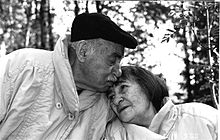This article has multiple issues. Please help improve it or discuss these issues on the talk page. (Learn how and when to remove these messages)
|
Semyon Lipkin | |
|---|---|
 Lipkin and his wife, poet Inna Lisnyanskaya | |
| Born | 6 September 1911 Odessa, Russian Empire |
| Died | 31 March 2003 (aged 91) Peredelkino, Russia |
| Occupation | Poet, writer, soldier |
| Period | 1911-2003 |
| Genres | Poetry, fiction, memoir, translations |
| Subject | World War II, History, Philosophy, Literature, Folklore, Jewish heritage, The Bible |
| Literary movement | Neo-Acmeism |
| Notable works | Kvadriga Memoirs, The Lieutenant Quartermaster (An epic poem) |
Semyon Izrailevich Lipkin (Russian: Семён Израилевич Липкин) (6 September (19, New Style) 1911 – 31 March 2003) was a Russian writer, poet, and literary translator.[1]
Lipkin's work gained wider recognition after its publication during the collapse of the Union of Soviet Socialist Republics (USSR). Throughout much of his working life, he was sustained by the support of his wife, poet Inna Lisnianskaya, and close friends such as Anna Akhmatova, Joseph Brodsky and Alexander Solzhenitsyn. Lipkin's verses include explorations of history and philosophy.[2]
His poems include references to his Jewish heritage and the Bible. They also draw on first-hand experience of the tragedies of Stalin's Great Purge and World War II (WWII). Lipkin's long-standing opposition to the Soviet regime surfaced in 1979-80 when he contributed to the uncensored almanac "Metropol." After this event, jointly with Lisnyanskaya, left the ranks of the official Writer's Union of the USSR.[3]
- ^ Rayfield, Donald (2013). "Review of After Semyon Izrailevich Lipkin; Regina Derieva: The Sum Total of Violations; Regina Derieva: Corinthian Copper". Translation and Literature. 22 (1): 133–137. doi:10.3366/tal.2013.0106. ISSN 0968-1361. JSTOR 24585306.
- ^ "National voice unheard for decades". The Sydney Morning Herald. 2003-05-13. Retrieved 2024-03-16.
- ^ Meyer, Ronald (2015-10-01). "Cold War Dress Code: Remembering Inna Lisnyanskaya". PEN America. Retrieved 2024-03-16.